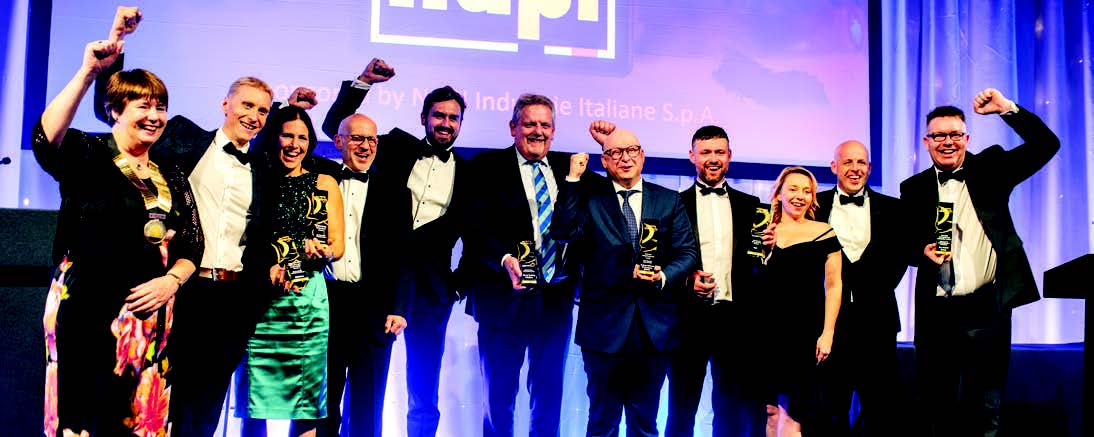
is expired
sub id Array
sub_active
is free


After what proved to be an exceptionally long period without face-to-face meetings and industry exhibitions cancelled last year due to Covid, the APEA Live Exhibition and Conference took place on 18 November at Milton Keynes Stadium and it was extremely well attended with 630 attendees at the dinner in the evening and was deemed a great success.
Thanks to the organisers, F2F, Alex Boudry the chairman of the APEA Events committee and of course all those in this industry who supported the event by exhibiting their products and sponsoring the awards and of course all of you that attended.
This year the Global Motor Industry Correspondent of the Financial Times Peter Campbell opened the event and it was very clear that his understanding of the challenges that the industry face was evident in his remarks and questions during the following panel sessions.
The Multi Fuel infrastructure risks and regulatory issues presentations followed and Jamie Thompson pointed out some of the fuel choices, possible interim solutions before 2030 and the European Standards guidance on the need to coordinate multi-fuel service stations which they believe will be the future. Their CEN-CENELEC guide 38 offers Guide for Multi Fuel Service Stations and will be available to download from the APEA website.
Clare Scawthorn, Petroleum and Alternative Fuels Manager from the London Fire Brigade, spoke about the advice being provided by Petroleum Enforcement Liaison Group (PELG) to Industry and Regulators to support these changes. The need to ensure that regulators are properly trained and the HSE will provide advice to regulators through the PELG notices.
The first Panel Session was on Future Fuels of UK Transport and Peter Campbell introduced Gordon Balmer, Executive Director of the PRA, Andy Eastlake, the CEO of Zemo Partnership (Zemo Partnership objectives are to accelerate transport to Zero Emissions) and Abrar Bajwa of ITM power who run Hydrogen filling stations.
We were reminded that the ban on the sales of new petrol and diesel vehicles by 2030 applied to cars and vans, with Heavy Goods Vehicles likely to follow by 2040. It was evident from the panel discussions that industry and Government meetings were most important to ensure that all possibilities were available and although the talk at present is all about electric vehicles the options for other zero-carbon fuel were discussed and will no doubt be developed in the future.
Some cautionary notes from Gordon Balmer about the potential loss of some £37 billion of road tax and fuel duty was almost certain to be replaced by some other method to recoup revenue for the Exchequer. We were advised to watch this space.
Gordon Balmer of the PRA then discussed the problems of the recent fuel shortages at petrol stations, and what the PRA had done as an organisation to assist the Government deal with this issue. It was evident that PRA members did much to inform the Government where the main problems lay and with up-to-date information on where the shortages were. The reasons for shortages in areas like London were that there were around 27,000 cars for one service station but outside urban areas there were around half that number. When pressed by Peter Campbell, Gordon stated that he felt some press reporting had encouraged panic buying.
The Future Proofing of Forecourt Retail Business had the following members: Mark Wilson, Chief Operating Officer of Fraser’s Retail; Filip Spevak, Franchise Manager of Insomnia Coffee Company and Frank McLaughlan, Sales Director of TSG Wash.
Discussion centred on how the forecourt will evolve in the coming years with changes in the fuels. The pandemic had already improved the sales and services offered by Petrol Stations with increased sales of goods, online shopping, parcel pickup, coffee etc.
Mark Wilson was upbeat about the future explaining that forecourts have adapted to change in the past and will continue in the future. He pointed out that a large percentage of their customers are non-fuel customers calling for other goods.
He also stated that liquid fuels are unlikely to stop completely with hydrogen, HVO and synthetic fuels being a choice and the internal combustion is not dead yet. Filling stations will have some electric chargers providing all the services for the motorist. The car wash is also making a comeback with Frank McLaughlan explaining that quality branded car wash operations are increasing popular with sales and profits in that sector rising. The coffee expert Filip Spevak talked about the coffee culture in the UK and the increasing popularity of sales at filling stations which helps operators to achieve their profit margins.
The Exhibition was well attended with a cross section of products and services and exhibitor feedback was excellent.
Social Media Stats
APEA Twitter account had over 4500 impressions
#APEALive was tweeted over 45 times
@apea_org was mentioned 23 times
Our APEA account had over 1700 visits
LinkedIn:
APEA’s LinkedIn page had over 380 visits
The APEA LinkedIn updates got over 8900 impressions
We had 82 new followers
Over 600 video views across LinkedIn and twitter
The pre-Dinner drinks were held in the exhibition area and sponsored by EuroTank, with the Awards Dinner sponsored by NUPI Industries Italiane S.p.a. The guests were welcomed by the Association’s Chairman, Doreen Pooley.
The Charity collection in aid of MK ACT, protecting against domestic abuse, (www.mkact.com), benefitted from raising £4025.00 from the dinner guests and sincere thanks from the charity.
The Awards for 2021 were hosted by Al Murray who proved an inspirational choice after lockdown and his humour kept the guests laughing throughout the event and long into the evening as people headed for the bar. It was great to be back!!
For information on APEA Live 2022 please go to
www.apealive.co.uk/2022
By Jamie Thompson, Chairman of the Technical Committee